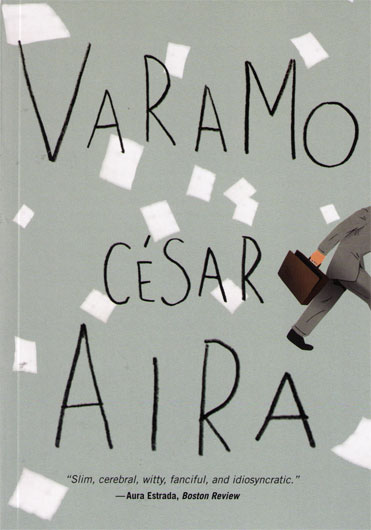.
.
There is a scene in VARAMO in which the protagonist, whose name supplies the novel’s title, finds himself in a café seated at a table occupied by three book publishers. They’re a cynical bunch. One of them encourages the inexperienced Varamo to try his hand at writing:
“In barbaric lands like the Americas, writers produce their best work before learning the craft, and nine times out of ten, their first book was their strongest, as well as being, in general, the only one they wrote.”
The prescription Varamo receives from his tablemates is this: First, write down some story “notes.” Then, “write out the notes one after another with some commentary in between. Try not to tidy them up too much; immediacy is the key to a good style.”
Only a handful of César Aira’s fifty-plus novels have been translated into English, which means it is impossible for non-Spanish readers to identify his best work. Yet from the pattern of the available work it’s beginning to look like Aira, despite his fecundity and his omnivorous instincts, is following the advice of the publisher in the café: This mad creator writes only one novel — and VARAMO is such a one.
The book, set in the Panamanian city of Colón in the year 1923, moves through a single evening and night experienced by a timid and lovelorn 50-year-old Panamanian civil servant. As is his common practice, Aira’s “notes” are strung into a somewhat disjointed but ever-forward-moving “chain of events.”
Varamo leaves work after receiving his salary in the unprecedented form of two counterfeit 100 peso notes. In a state of anxiety he returns home to care for his paranoid mother. He works on a taxidermy project. Back on the street, on route to his favorite café he watches an automobile competition known as a “regularity race.” He stumbles upon a conspiracy to overthrow the provincial government. He reacquaints himself with a romantic interest. Reaching the café, he’s given tips about the writer’s trade. When midnight strikes he wanders through the deserted town square and comes face to face with a transformative vision. It is an epiphany both “interesting and poetic: a `writerly’ experience; for him, everything was `writerly’ now.” He goes home to write a long and soon to be renowned poem.
These narrative “notes” are interrupted periodically by Aira’s trademark asides, discursions that sometimes reach the level of mini-essays. They engage a broad range of disciplines including economics, political science, sociology, psychology, philosophy (especially the mystery of time), and postmodern literary strategies. As always, Aira is fascinated with cycles, reversals, switchbacks, dichotomies (tropical exuberance vs. impeccable formality; abstract vs. concrete; the imaginary vs. the real). Paradoxes and oxymorons abound: “transparent labyrinths”; “he had continued to move within his paralysis”; he was “nostalgic for the present.”
The unsuspecting poet Varamo and (I suspect) Aira both enjoy the freedom to be inconsistent. Early on Varamo and Aira observe, “Light was what made the world work,” while later they declare, “Money is what ultimately moves the world.” Aira has a special disdain for bureaucrats: “Like nearly all public servants, [Varamo] didn’t do anything special to earn his salary.” Aira’s mixed bag aesthetic allows the author to inch toward sentimentality, albeit formally expressed: “The most awkward aspect of individuality was being left out of the shared understandings that create social bonds.”
The text of VARAMO, smoothly translated by the veteran Chris Andrews, occupies a mere 124 pages and is not divided into parts or chapters — all the better to maintain a forward momentum that Aira so values. On the final page Aira indicates the date of the book’s completion: 15th of December 1999. Like Varamo, the author was 50 years old.
When designing VARAMO, the publishers corrected a problem some readers (I among them) encountered with “The Seamstress and the Wind,” whose text is set in a very small font size. In VARAMO the reader is well served.
.
A version of this review is posted on Amazon, here.
